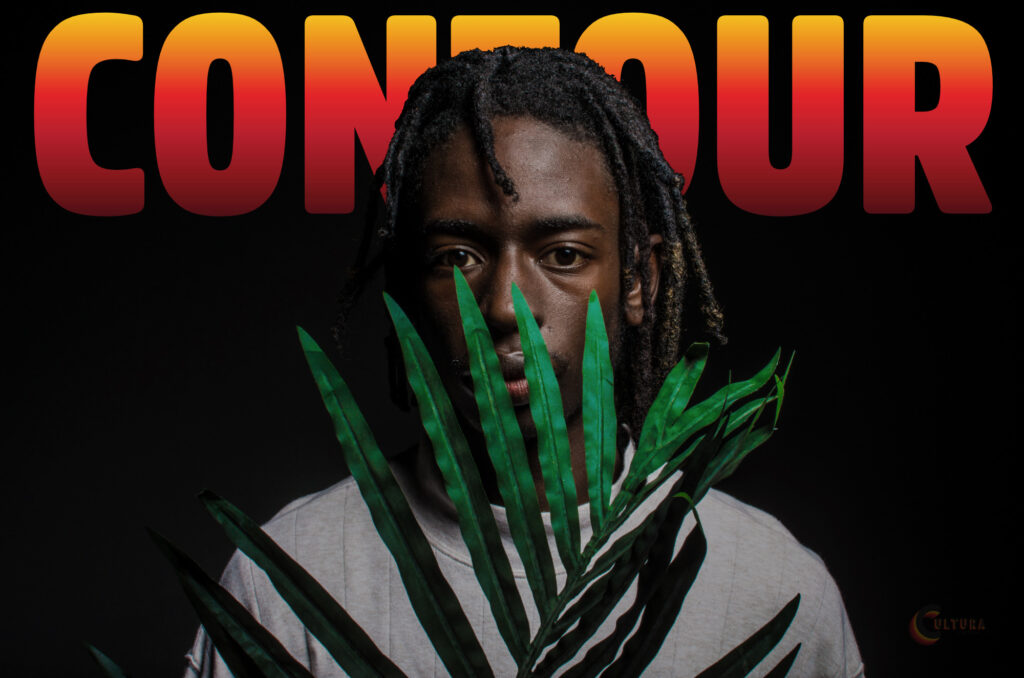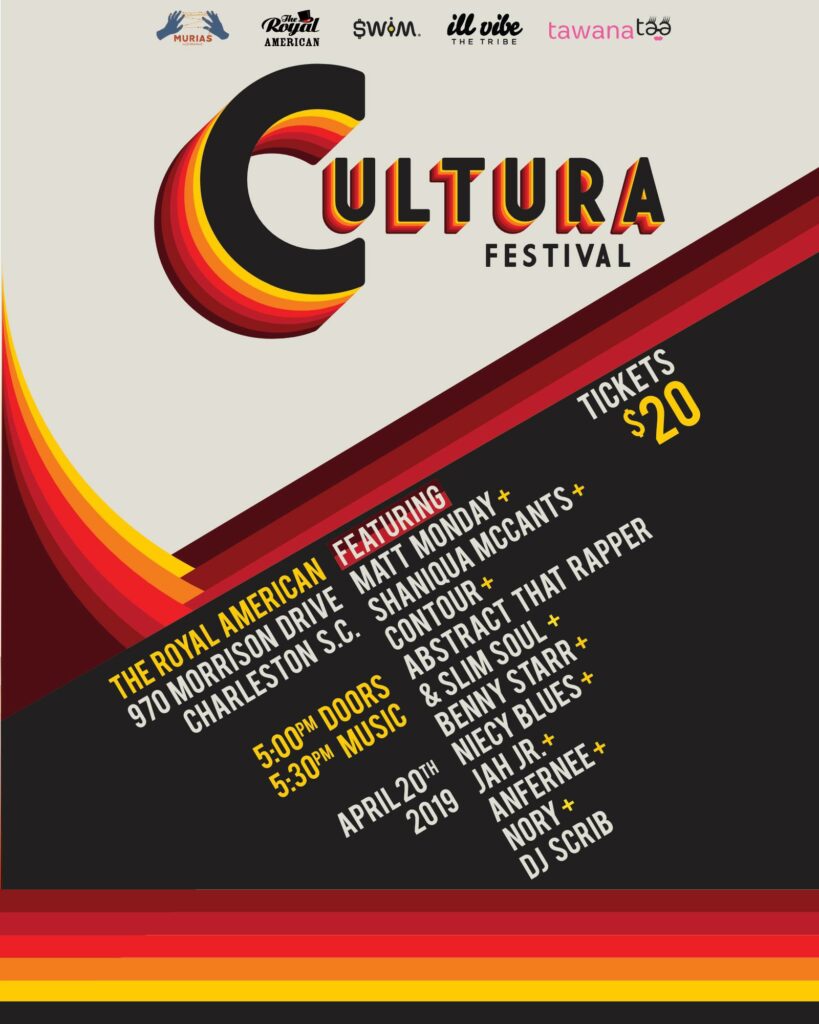- This topic has 0 replies, 1 voice, and was last updated 1 month, 1 week ago by
 chubes.
chubes.
Log in to view. Or, click here to read the blog version of this post (with ads).
-
#46290| March 23, 2024 at 6:53 am
 chubesHMFICRank: Frozen Foods IslePoints: 10493
chubesHMFICRank: Frozen Foods IslePoints: 10493Contour’s Khari Lucas Shares His Creative Voice
Published: April 15, 2019
Photo: Black Dave Contour is one of the most interesting musical projects in all of South Carolina right now, and I’ve been trying to wrap my head around how the project’s creative driver Khari Lucas views his art for as long as I’ve known about him. When Contour released their first full-band album, Live on Record, near the end of last month, I reached out to arrange an interview with Khari, and I was stoked to finally have the opportunity to ask him some of the questions that had been bubbling around my head for the past few years. We sat down last week and dug into a conversation about his perspective as an artist, as well as the upcoming Cultura Festival at the Royal American, which will take place this coming Saturday, April 20th.
According to Khari, Live on Record came about as a solution to a problem. Contour’s earlier releases were all self-recorded and self-produced, and more beat-focused in nature. When the band Contour would play shows, people would come up to Khari afterward and ask where they could listen to the music. In the past, there wasn’t music out in the format that the band plays live, and so Khari would have to tell fans that there wasn’t really a way to listen outside of the live environment. Live on Record solved that problem, and now you can hear what Contour sounds like in the live setting right in your headphones.
“Even outside of that, the songs on this record reflect much better where I’m at artistically now, which is important.” Khari says. “The writing on this record incorporates the areas of art i’ve grown into as far as composition and instrumentalism. My production background is the foundation and I’m using that to keep moving ahead.”
Just like Contour’s earlier releases, Live on Record is very difficult to pin to a genre, but it’s certainly jazzy, and I might even place it loosely in the rock category. Khari isn’t one for explicitly defining his sound, as he feels that listeners should find meaning in the music for themselves, but he did speak to the jazz influence, which you can hear running through everything he makes, but is especially prominent with Live on Record.
“There are two things that really started it,” Khari explains. “I moved to Houston for a year in between 2014 and 2015, and that’s when I got really heavily into production to begin with, and I was making a lot of beat tapes and stuff. I was sampling a lot of jazz music, like jazz fusion, Japanese jazz, lots of different kinds of jazz when I was making those beats. And eventually that led into me developing just a real appreciation for the music itself.”
“At the same time I also stumbled upon Houston’s free jazz scene, and kind of accidentally made friends with some of the older people there who I guess maybe saw something in me.” Khari continues. “I was like 19 then, and they went out of their way to make sure I had access to little workshops here and there. There were a lot of really great classic jazz musicians that would come through this one venue kind of near where I lived. I got exposed to a lot of really great, straight from the source jazz music at that time, and I think that kind of stuck with me. And then, fast forward a couple years to around the time the band starts, and that gave me a vehicle to actually be playing music like that, and then that kind of informed my own personal writing, and it just got more influenced in that way.”
The jazz thread running through Contour’s music is part of what makes it so interesting, and lends itself to what I find to be a late-night feel. Because of this I assumed that Khari did most of his writing in the small hours after midnight, and I was surprised to learn that the bulk of his creative process takes place during the day.
“I actually do most of my recording in the middle of the day,” Khari says. “I am really rigid as far as my productivity. I typically try to get up early-ish, and start listening to music and watching documentaries or interviews, or reading. And this is on a good day, I’m not consistent. Building up to a creative place, where I’m really honed in. Then I start working on things.”
Even with Khari’s rigid productivity, he is no stranger to the creative slump. Every creative understands the feeling of not being able to create, and knows the frustrations that come along with it. Khari has two ways of dealing with creative blocks, and they both offer insight into the mindset behind his music.
“One, and this is something that I feel very passionately about, is giving in to it,” Khari says. “I try and reinforce in my own mind that my worth as an artist, and my quality as an artist, are not tied to how productive I’m being at any given moment. It could really just be exhaustion, or naturally the fact that I’m just not really having a lot of ideas, at which point I try and be like, ‘Okay, I’m just gonna relax.’ Sometimes it can be that I’ve been spending too much time on social media, or my mind is clouded by other things, in which case I can typically fix it by doing what I was describing, by exposing myself to and consuming things that are inspiring. I think that just giving in to it is typically the best approach.”
“One of the schools of thought that I’m really into is Daoism, and one of the principal tenets of that is intuitively understanding the flow of, I guess the universe, for lack of a better word, and not acting against it,” Khari continues. “So a lot of times if I’m not being creative in a way that I like, it might just mean that it’s not what I need to be doing right then.”
Contour’s music is very cerebral, and you can feel Khari’s unique energy radiating while you listen. That energy is what got the wheels turning for me back when I first heard his 2017 album Softer, and I found myself looking for something concrete to grab onto to help me find a definition for what I was hearing. There isn’t a true definition, at least not one that Khari is willing to share, and that gives the project a level of mystery that isn’t often found in the modern world of music. It also invites listeners to think about the music for themselves, which is exactly what Khari wants.
“I discovered a few years ago that I don’t particularly like when artists over-explain their work. I think in the blogging, PR world that we live in today, we kind of use that as a promotional tactic, in an attempt to be relatable,” Khari explains. “I do want to make a point to say that I’m not saying that in a way that’s looking down on people. I think relatability is a very positive part of art. I really strongly held that idea a while ago, and its informed what might be the mysterious aspect of how I present work. In recent times I’ve been questioning it a little bit, and I have a more case-by-case basis approach now. Personally, I like for people to be able to interpret my work in whatever way makes sense to them. I think if I were like, ‘This means this,’ they might lose that possibility, and I think I’d be robbing them of an experience. But I do think that for some work it’s necessary to be direct about what you’re trying to say with the work, and I appreciate that approach as well. I think I just maybe haven’t created work myself that requires that approach.”
The direct approach that Khari mentioned is one that is used prominently used by Charleston hip-hop artist Benny Starr, who uses his art as a vehicle for social change, and specifically for making a positive impact on Charleston’s black community. I mentioned this to Khari, and then I asked him about Cultura Festival at The Royal American, where Contour will play along with Benny Starr and many more black artists from a wide variety of genres. Matt Monday curated the event, and it is huge for Charleston because it’s the first major event in the city to feature all black artists. Khari offered his perspective on Cultura and what it means for Charleston, and since it is much more well-informed than my own perspective, I’m going to let him do most of the talking here.
“Charleston, for as long as I’ve been a musician here, has struggled with diversity. Nobody who’s lived here for any period of time doesn’t know that, so it goes without saying,” Khari says. “Even though everybody knows that, everything that happens still, it’s like everybody’s real careful not to step on anybody’s toes in the ways of diversity now. We have seen a lot of growth in the past couple years or so. Royal American, for example, you’ve seen a lot more hip-hop. They’ve become one of the venues that you can have hip-hop at. Which is cool, and it’s necessary.”
“But there’s still a kind of inherent segregation, and I use the word segregation very, very intentionally, that exists in the creative community in Charleston,” Khari continues. “That segregation is informed by the greater segregation that exists in Charleston as a city in and of itself. You have downtown Charleston, James Island, Mount Pleasant — extremely predominantly white. Downtown being the medium between those areas and North Charleston, where it is extremely predominantly black. Downtown Charleston actively displacing its residents of color in order to make way for more commercial building. When you have a place that is fundamentally segregated, every sub-community and sub-sect of that place is going to be segregated.”
“We are talking about growing as a creative city, and becoming a hub for music. And so we have things like High Water Festival that come up. I want to be careful not to sound like I’m bashing High Water, because I’m not. And their lineup is not completely un-diverse, but it is a largely-white catering, white funded, white event, that is occurring in North Charleston, where you don’t really have anything of that sort going on, for reasons that I would speculate are financial. However, it’s a cost-prohibitive festival, with not really anything in place for the people in that community and in the surrounding area to be able to attend that festival.”
“We have this [Cultura] festival, and obviously it’s small right now because it’s the first year, but we have a festival that centers black artists of a variety of genres — hip-hop, r&b, soul, psychedelia, bands, rappers, DJs — represents the legitimate scope of creativity that is held by the black community in Charleston, and it is not particularly cost-prohibitive. I think it’s really important. I think it makes a statement that there are platforms for us in the city, and also for black creatives of all varieties. I’m not saying that you can’t have a white-catered festival. It’s not realistic. We should be able to have a black-catered festival, or a white-catered festival. The end goal is diversity, but also the ability for there to be things that operate on that level.”
“Say I’m not me, and I’m like an 18-year-old version of me, and I’m trying to figure out my sound and what I’m doing, and feeling like there’s not an outlet. And then I see this festival, and I’m like, ‘Oh, wow, there’s all these different kinds of black artists playing this festival.’ That’s gonna be a really encouraging thing. I think that no matter what happens with Cultura, it’s a success in and of the fact that it exists.”
Khari and I riffed off our discussion about Cultura Fest by trying to dig at what the next step for Charleston looks like, and if it will be possible to bridge the gap between the city’s black and white creative communities. We have seen a little bit of the communities coming together in recent times, most notably the Ingenium Entertainment-hosted show at The Purple Buffalo late last year that included Contour, Daddy’s Beemer, Jah Jr., Anfernee, and DJ Party Dad. That show featured both black and white artists, and it was a small step in the right direction for Charleston. The venue was packed that night with one of the most diverse crowds I have ever seen in this city, and that’s something that I believe should be the goal for our music scene.
“I said all of that about segregation being an issue, and needing to move toward a place where it can be people coming together. But I’m mentally split, because that is me being ideal. For that to happen you have to have interest, you have to have people who are willing to do the work to make that happen, you have to have people who are going to consume that thing, you have to have the infrastructure to make it possible,” Khari explains. “In a perfect world, it would be people in the community who have those resources see this [Cultura] festival and say, ‘Okay why don’t we start working together more to see what other kind of connections could be made between different creative communities and see how we can elevate that.’ It would have to be on the level of organizers and people with resources, and it would have to start from there.”
Khari was a bit more skeptical about the whole thing than I was, and our conversation about the next step never truly reached a conclusion. We did agree that it doesn’t need to be a major event, and that it could start small, but Khari made a good point about the meaning behind bridging the gap that goes to show just how much more work is to be done before Charleston can truly become something close to the ideal of a fully diverse, inclusive creative community.
“I would need to think about what my vision of inclusive diversity is, and I’m not sure what that is right now. Does it even matter if we have a music festival where all the best performers, black or white, can play, when people are still being displaced from their homes? Are my priorities even in order the right way? It gets kind of messy in my head when I really start to think about it,” Khari says.
One thing is for sure: Cultura Festival is a beautiful event. Similar to the Summer Shindig, Cultura will take place in the Royal American parking lot with a large outdoor stage for performances. Doors open at 5pm on Saturday, April 20th, and the music will run right up until 11pm. Tickets are $20 and available here. Full lineup poster is at the bottom of this page.
Khari and I ended our conversation with a little bit about what comes next for Contour. In true Khari fashion, he would not tell me what exactly he has planned, but he did mention that what he feels is one of the best songs he’s ever written has not been released yet. He also said that there exists a follow-up to Live on Record, but he wasn’t ready to release any more details.
“I know that there is another record,” Khari closes. “And that’s all I know.”

- You must be logged in to reply to this topic.
Users Currently Online: 0
Most Ever Online: 8 on 02/06/2024
Total Members: 197